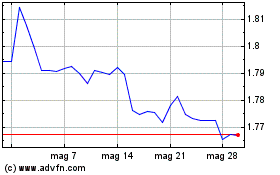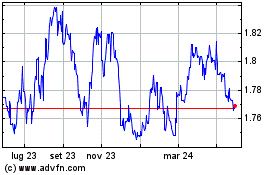NZ Dollar Falls Amid RBNZ Rate Cut Speculation
03 Ottobre 2024 - 6:18AM
RTTF2
The New Zealand dollar weakened against other major currencies
in the Asian session on Thursday, as traders speculate the Reserve
Bank of New Zealand is likely to slash its interest rate at the
next monetary policy meeting.
Markets speculate the Reserve Bank of New Zealand (RBNZ) to cut
its Official Cash Rate (OCR) by 50 basis points to 4.75 percent at
its next monetary policy meeting to be held on October 9, 2024.
Investors remain concerned about the prospects of a wider Middle
East war, with Israel's war cabinet reportedly weighing its
response after Iran launched its largest-ever attack on the country
in an escalation of hostilities.
Multiple airstrikes were reported in Beirut earlier today with
explosions heard in the Lebanese capital. Authorities said at least
six people were killed.
Amid West Asia conflict escalation, several countries have
issued advisories and some have evacuated their citizens.
In economic releases, trading later in the day may be impacted
by reaction to the latest U.S. economic data, including reports on
weekly jobless claims, service sector activity and factory
orders.
In the Asian trading today, the NZ dollar fell to a 6-day low of
1.7704 against the euro, from yesterday's closing value of 1.7633.
The kiwi is likely to find support around the 1.81 region.
Against the U.S. and the Australian dollars, the kiwi dropped to
nearly a 2-week low or 0.6227 and a 1-1/2-month low of 1.1025 from
Wednesday's closing quotes of 0.6262 and 1.0990, respectively. If
the kiwi extends its downtrend, it is likely to find support around
0.60 against the greenback and 1.11 against the aussie.
The kiwi edged down to 91.22 against the yen, from an early near
2-week high of 91.93. On the downside, 87.00 is seen as the net
support level for the kiwi.
In economic news, the services sector in Japan continued to
expand in September, albeit at a slower pace, the latest survey
from Jibun Bank revealed on Thursday with a services PMI score of
53.1. That's down from 53.7 in August, although it remains above
the boom-or-bust line of 50 that separates expansion from
contraction. The data also said the composite PMI slipped to 52.0
in September from 52.9 in August.
Japan's newly appointed Prime Minister Shigeru Ishiba said that
the nation is not prepared for additional rate hikes, following a
meeting with the central bank governor.
Looking ahead, PMI reports from various European economies and
U.K. for September and Eurozone PPI data for August are slated for
release in the European session.
In the New York session, U.S. weekly jobless claims, Canada and
U.S. PMI reports for September and U.S. factory orders for August
are set to be released.
Grafico Cross Euro vs NZD (FX:EURNZD)
Da Ott 2024 a Nov 2024

Grafico Cross Euro vs NZD (FX:EURNZD)
Da Nov 2023 a Nov 2024
